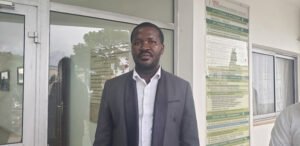Between Duty and Danger : Community health workers Bring Hope To Crisis Heat Zones

The ongoing Anglophone Crisis in Cameroon has plunged the North West and South West Regions into turmoil, leaving community healthcare providers navigating a perilous landscape, where they grapple with a harrowing dilemma: their unweaving commitment to saving lives, colliding with the stark’s realities of danger. Moving through bombs in Mamfe, Konye, through the dark horror forest in kwakwa, and Muyuka, these community healthcare workers face life threatening situations as they strive to provide healthcare to victims of the crisis.
Since 2016, the conflict between the Anglophone Separatists and the Government of Cameroon, has resulted in a widespread violence, displacing thousands, and significantly impacting healthcare access. Hospital and clinics are often targeted and many community healthcare workers are faced to operate in fear.
According to the UN office for the Coordination of Humanitarian Affairs (OCHA), over five hundred and eighty-three thousand, one hundred and twelve (583,112) people are internally displaced as a result of violence in the North West and South West regions. OCHA also added that more than 210 health facilities are no longer functional because of destruction or abandonment by health personnel.
Healthcare infrastructure in some areas especially in the Southwest Region have crumbled with hospitals burned, community healthcare providers kidnapped and others killed. This has forced some healthcare providers to operate under constant threat as each day present a choice between their duty to provide health and the risk of their own lives.
52-year-old Nchinda Oumarou Kenyi is a farmer and a community health worker in Yoke- Malende, in Muyuka Subdivision of the South West Region of Cameroon: “When the crisis started, I had nowhere to run to. I could not just move with an empty hand; I had no money to move to another town to start afresh”.
He was one of those trained as community health workers in 2014 and in 2018, they started effective work.
“We started in 2018 to distribute drugs and vaccines. We were suspected to be spies for both the Government and the Separatist fighters. Sometimes we were arrested and questioned and other times, harassed. I was attacked and arrested from my home in 2023 by the Government Security forces and accused of soliciting with separatist fighters. I was not given any room to talk. I had to go down on my knees to plead my innocents before I was let go”.
But this didn’t stop him from doing his job in his Yoke community and to follow his training by identifying and reporting cases of infectious diseases, distributing medical supplies such as medicines and vaccines, as well as providing first aid and basic medical care for injuries and illnesses.
“The thing is, when you have the passion for something, you will keep on doing it no matter what. When I move around and see the children and families that I helped, it gives me joy that I could help in my own little way. I help at the expense of my life but at least my conscience is free when I do,” Oumarou said.
These community workers are caught in a complex web of loyalty and fear as they weigh their ethical responsibilities as humanitarian workers, against the immediate threats of their lives.
“I remember during one of the lockdowns in Malende, a pregnant woman was in labor, I had to leave the house and help her to the hospital with my bike, and she gave birth to a baby boy 20 minutes later. Another one was a neighbor whose husband was coming up with a stroke, I had to rush him to the hospital using my bike and today he is fine”, Oumarou explains.
As the crisis deepens, Oumarou’s role becomes increasingly vital. He works tirelessly, often without pay to ensure that those affected by the conflict in Muyuka, receive the healthcare they desperately need.
“Oumarou embodies the spirit of humanitarian work,” says Dr. Njang Emmanuel, District Head officer in Muyuka. “His selflessness and bravery inspire us all to do more.”
Community Healthcare providers in these crises heat zones in the South West Region, face profound ethical dilemma. With limited resources, Nkolle Enongene, another community health worker in Konye noted that he must prioritize care, which often leads to moral distress. He adds that, the anguish of losing patients due to lack of medical access by the community weighs on his conscience, as he navigates the different health districts in Konye, with impossible choices.
“It is a challenging period with over eight health districts to cover in Meme division, at the start of the crisis in 2017. I remember a time we slept in the forest on our way to distribute vaccines, we work on foot to get to some health facilities. I do this because I like to take care of people.” Nkolle said.
Despite the danger, healthcare workers often become pillars in their communities. They not only provide medical aid, but also instill hope to those in need of medical care.
The dilemma faced by community healthcare providers in the suburbs of the South West Region is a testament to their dedication and resilience. As they walk the thin line between duty and danger, their stories remind stakeholders of the urgent need for national and global support and advocacy. The courage of these individuals does not only save lives but also inspires hope in the darkest of times.
By Emmanuela Siy
read also : Hunger in the World : FAO Calls for General Mobilization to Eradicate it














